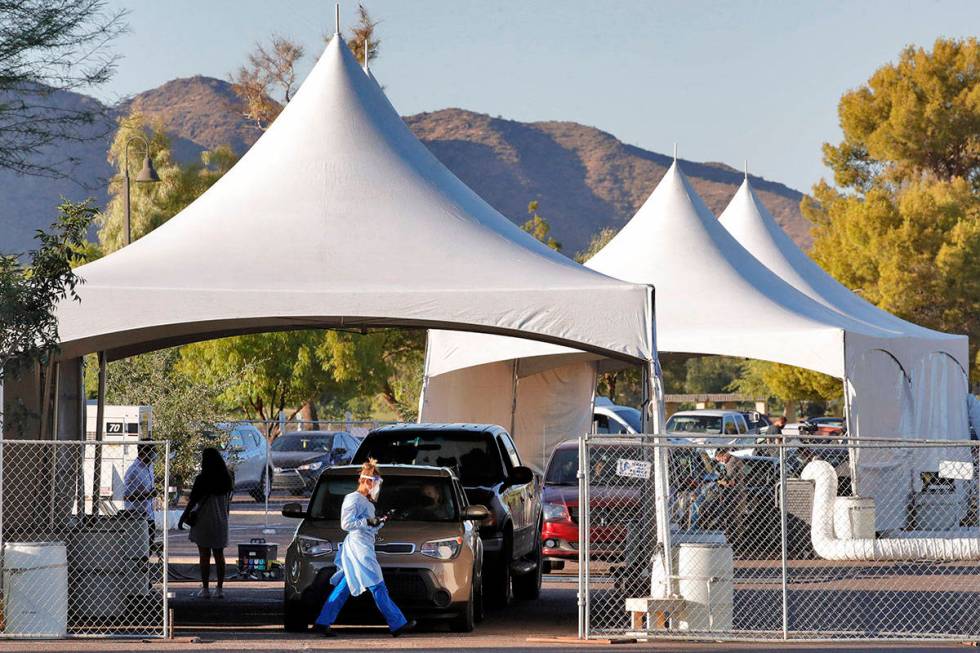Arizona COVID-19 triage care again likely, officials say

PHOENIX — Arizona health care leaders say hospitals may soon have to make tough decisions about the treatment of COVID-19 patients amid surging cases that are crowding intensive care units.
The state’s largest hospital chain, Phoenix-based Banner Health, suspended elective surgeries starting Friday to free up room for treating COVID-19 patients as new records for infections and hospitalizations are being set regularly.
Some of its hospitals are among those sending away ambulance transports or halting transfers from other hospitals, while still accepting walk-in patients needing emergency care.
Now, hospitals may have to prioritize care among patients, deciding who first gets access to limited resources.
“Triage may soon be necessary if volumes continue to increase like they did this past week,” said Dr. Marjorie Bessel, Banner Health’s chief clinical officer.
On Friday, Arizona reported over 10,000 additional confirmed COVID-19 cases.
Bessel said Wednesday that the rate of COVID-19 hospitalizations is increasing exponentially in Arizona, with bed occupancy jumping in December by 150%.
“It might not be for another week, but we do seem headed that way,” Will Humble, Arizona Public Health Association director and a former state health services director, said Thursday.
What’s happening now?
Humble said Arizona hospitals since early December have already been under “contingency standards of care” that are one step before more drastic rules aimed at helping decide such things as which patients should be admitted or get an ICU bed.
Governed by a committee of health professionals and government officials, the protocols also give hospitals some liability protection as they grapple to provide the best care they can in a difficult situation.
Faced with a shortage of beds, Humble said under the current guidelines hospital personnel may now opt to keep a patient in the emergency department for overnight observation rather than admit them, or place a candidate for intensive care in a regular hospital bed until an ICU bed opens up.
“This is by far one of the most difficult things for me and my colleagues, sending a patient home when we would normally admit them,” Dr. Frank LoVecchio, an emergency room physician at Arizona’s Valleywise Health, said Thursday. “But you reach that point when the needs exceed what is available.”
What’s coming next?
Health care officials say the more serious “crisis standards of care” for Arizona hospitals could be activated by the medical advisory committee that oversees them if providers become increasingly overwhelmed.
LoVecchio noted that Arizona was the first state following the virus outbreak to adopt the triage protocols for a period in July until closures of businesses such as gyms and restaurants helped bring infection numbers down.
“Haven’t we learned anything?” he asked, noting the state has not ordered certain businesses to close again despite spiraling numbers of infections, deaths and hospitalizations. “It’s incredible this could happen again.”
Bessel said patients with the disease already account for half of all people hospitalized in the Banner system in Arizona, with the hospitals collectively reporting 104% of licensed bed capacity. ICU bed occupancy by COVID-19 patients has increased by 600% since Nov. 1, she said.
“These COVID-19 patients are very very sick,” said Bessel. “They require a great deal of care and much longer stays in the ICU compared to the typical ICU patient. Many of them also require the support of a ventilator.”
Who’s treated first?
Under “crisis standards of care,” triage protocols take effect and put patients less likely to suffer organ failure and more likely to live longer first in line for treatment.
All decisions are supposed to be made based on long term outcomes, without consideration of such things as ethnicity, color, national origin, religion, sex, age and sexual orientation.
“What triage would look like would be that we might — if we got to that point — be unable to care for everybody,” Bessel said. “Please help us never get to triage. Shrink your circle, and wear your mask.”